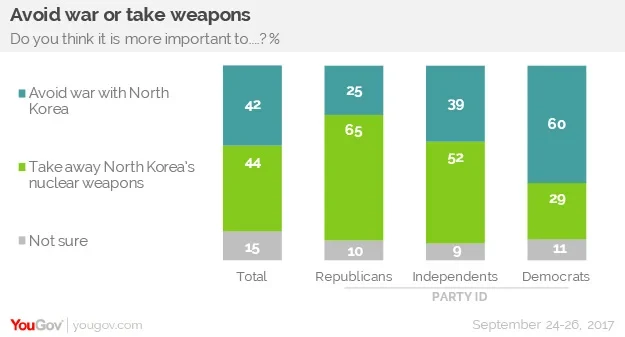79% of the public is concerned about a war with North Korea
After a week of escalating tensions between the United States and North Korea, highlighted by an exchange of threats and insults at the United Nations, Americans of all political beliefs worry about the possibility of war – and they also express concerns about Presidential decision-making. Most Americans in the latest Economist/YouGov Poll believe the President does not listen to his advisers and does not take care before he speaks. More than six in ten in the President’s own party believe he reacts and speaks without thinking very much, and a plurality believes he does not listen to his advisors.
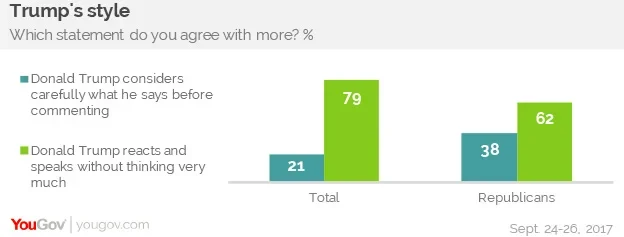
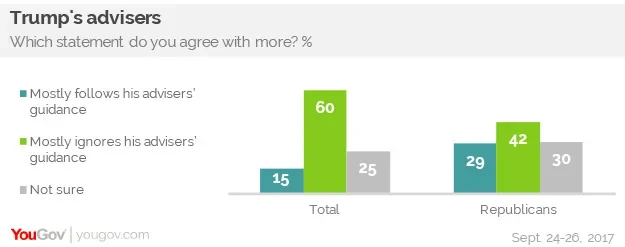
Some of the advisers that Americans think the President may be ignoring when it comes to foreign policy are viewed favorably – for example, even Democrats have a favorable opinion of Chief of Staff John Kelly. Overall, twice as many Americans like Kelly as don’t, and they give Secretary of State Rex Tillerson, Secretary of Defense James Mattis, National Security Advisor H.R. McMaster, and UN Ambassador Nikki Haley favorable ratings, too.
The last week of attacks at the UN, with insults from both sides, has made Americans nervous. The public sees the two leaders, President Trump and North Korea’s dictator Kim Jong-Un, as having said inappropriate things about each other. And while many more see Kim’s statements in a poor light, there is also a negative opinion of Trump referring to Kim as “Rocket Man.”
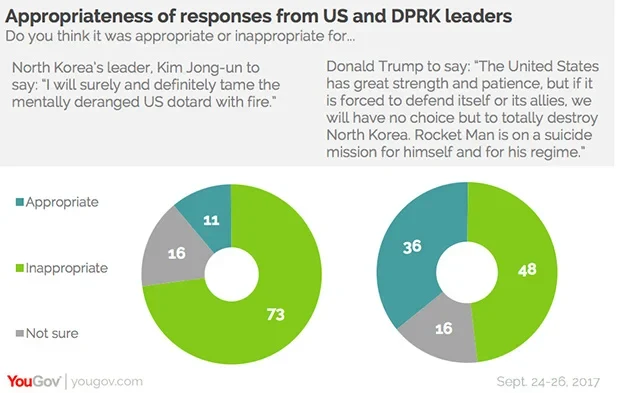
More importantly, perhaps, Americans think both men meant what they said – and weren’t just talking tough.
So Americans are nervous about what happens next. More than three in four are at least somewhat concerned about the possibility of a full-scale war with North Korea. Democrats are twice as likely as Republicans to say they are “very concerned,” while most of the 73% of Republicans who express concern say they are just “somewhat concerned.”
At the moment, North Korea is perceived as the biggest threat to the United States by far – 73% view the country as an enemy of America. In contrast, 43% describe Iran that way, and just 27% call Russia an enemy.
Americans are torn about the possibility of military conflict with North Korea. Half support military action against North Korea in order to end that country’s nuclear program (Republicans are more than twice as likely as Democrats to say this). But when asked whether it is more important to take away North Korea’s nuclear weapons or to avoid war with that country, the public splits down the middle. Republicans focus on taking away the weapons; Democrats on avoiding war. Independents are evenly divided.
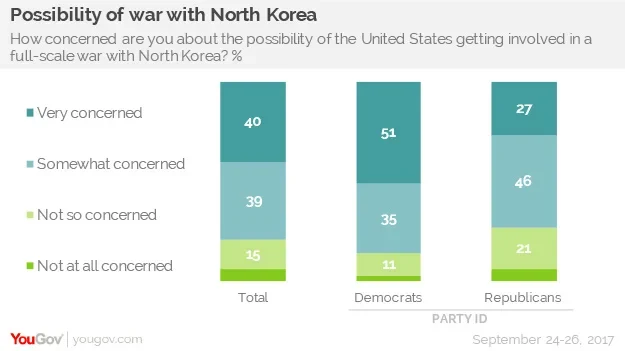
Much of the recent conflict between the US and North Korea has taken place at the United Nations, an organization that Americans continue to like, though they see its weaknesses. In this poll, just 28% say the UN is doing a good job trying to solve the problems it faces. More (39%) say it is doing a poor job. That assessment has been true in polls since the 1980’s. Americans continue to have a favorable view of the UN, however, and hardly any – just 13% – think the United States should give up its membership in the organization.
Jitters about the Trump foreign policy continue to keep the President’s approval rating low. Only 37% this week approve of how he is handling his job overall, the same percentage as approves his handling of foreign policy in general. 75% of Republicans approve of his overall job performance, but that is down nine points in the last week. When asked if they would like President Trump to run for re-election in 2020, just over half of Republicans say they would. But that too is down nine points in the last week. One in four Republicans aren’t sure whether or not they want the President to run again.
Worries about the possibility of war in general are high, and have been for most of the time Donald Trump has been in the White House. This week, six in ten think he is likely to get the country into a war. Republicans are less likely to agree, but more than four in ten Republicans think war is likely during this Administration.
